

Tao Te Ching
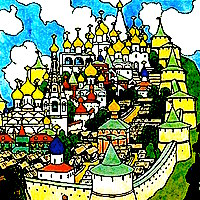
from Buyan by Ivan Bilibin
Russian (Росси́я) Lineage
Dostoevsky said that, "All true Russians are philosophers." That was a long time ago but it may still at least have some truth to it. The largest country in the world by area with only 144 million people, Russia has more than 7.9 times the land areas as the continental USA but the USA has 2.25 times the population. That makes the area per Russian c. 18x more than the area per American. Perhaps the vast empty spaces, frigid winters, and dark nights helped channel Russian culture in a dark, serious, and semi-depressed direction. Rooted in Orthodox Christianity, Russian culture also has strong influences from Islam, Buddhism, Hinduism, Judaism, and Siberian shamanism.
People (20)
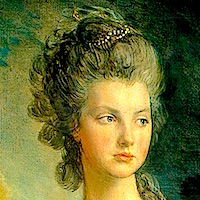
Catherine the Great Екатери́на Вели́кая (Catherine II)
1729 – 1796 CE
Russia’s longest-ruling female leader, “enlightened despot,” author, great patron of the arts, flamboyant and powerful; Catherine the Great helped create and ruled over Russia’s Golden Age revitalizing the institutions, modernizing it’s infrastructure, helping the serfs and emphasizing the arts. She shared more and more power with the nobles, tried to help the peasants, but the rapid expansion of the state relied on taking away much of their freedom and land causing their dissatisfaction and rebellions. She enthusiastically supported the The Enlightenment, helped Russia to become one of Europe’s great powers, greatly expanded colonizations that went as far as Alaska but was accused of many unjust wars. She established the first state-financed higher education institution for women in Europe and supported French philosophers like Voltaire and Diderot when his Encyclopédie was being oppressed in Europe. More licentious than most of her male counterpoints, history records 22 male lovers, many much younger, one only 22 when she was 61.
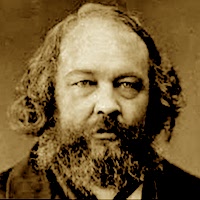
Mikhail Bakunin
1814 – 1876 CE
Romantic rebel, revolutionary anarchist, founding father of modern socialism
Revolutionary anarchist, famous ideologue, and founder of collective anarchism; Bakunin promoted anti-authoritarian Socialism which put him at bitter odds with Marx and his followers who wanted to establish authoritarian people's states. This philosophical disagreement grew into a bitter hatred, a slander campaign by Marx, Bakunin's exile and 12-year imprisonment. When his warnings about Marxist states becoming one-party dictatorships proved prophetic, his influence regained credence and his influence spread into modern times through thinkers like Noam Chomsky, Kropotkin, Herbert Marcuse, Neil Postman, and A.S. Neill becoming—in many ways—more influential than Ma
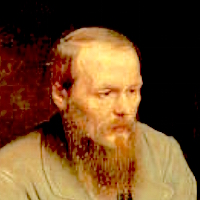
Fyodor Mikhailovich Dostoyevsky Фёдор Миха́йлович Достое́вский
1821 – 1881 CE
One of history’s most influential novelists and one of the greatest psychologists in world literature; Dostoyevsky led a tortured life that included being arrested for discussing banned books, being sentenced to death, spending 4 years in a Siberian prison camp, 6 years of forced/exiled military service, and struggling with a gambling addiction that made him have to beg for money. His second wife who he met when she was 19 and he 25 years older, helped turn his life around and produce some of the world’s best literature. His books have been translated into more than 170 languages and he was admired by Hermann Hesse, Ernest Hemingway, James Joyce, Kafka and Sartre. Albert Einstein called him a "great religious writer,” Nietzsche “among the most beautiful strokes of fortune in my life", Sigmund Freud called The Brothers Karamazov "the most magnificent novel ever written,“ and Virginia Woolf said, "Out of Shakespeare there is no more exciting reading.” His influence in modern time extends to the existentialists, surrealists, and the Beat generation.
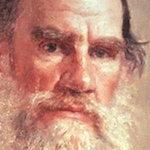
Leo Tolstoy
1828 – 1910 CE
One of the greatest authors of all time, Tolstoy’s dedication to nonviolent resistance had a deep impact on leaders like Mohandas Gandhi and Martin Luther King. His influence on education was opposed and stopped by Tsarist secret police but still became the first example of democratic education. Inspired by the Buddha, Confucius, and Chinese traditions, he was a strong Christian in a style like the early Gnostics and believed in seeing “The Kingdom of God Is Within You” rather than relying on an external church organization or priests. Excommunicated from the Russian Orthodox Church, he revived and inspired an authentic and practical Christian philosophy.
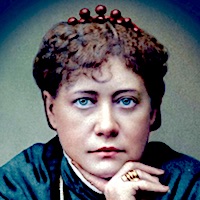
Blavatsky, Helena Еле́на Петро́вна Блава́тская
1831 – 1891 CE
Co-founder of Theosophy
Mystic, medium, philosopher, co-founder of Theosophy; Blavatsky traveled widely and claimed to meet many “Masters of the Ancient Wisdom.” She studied and practiced in Tibetan monasteries, became one of the first Westerners to ever become a Buddhist, worked closely with Hindu reform movements, and criticized the spiritual materialism of the spiritualist traditions she became linked with. She worked hard to bridge religion to and with philosophy and science but the scientific community characterized her as “one of the most accomplished, ingenious, and interesting imposters in history.” She wrote about ancient giants she believed made Stonehenge, the history of Atlantis, and many tenants of esoteric spiritualism. Her efforts became a major influence on the spread of Hinduism and Buddhism in the West as well as on Rudolf Steiner’s Anthroposophy and the New Age Movement.
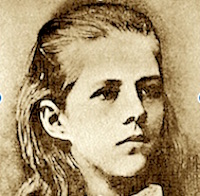
Anna Grigoryevna Dostoyevskaya ригорьевна Достоевская
1846 – 1918 CE
The woman behind the man and clear example of “better half,” Dostoyevskaya started helping Dostoyevsky as a 19-year old secretary when he was 44 and soon became not only his devoted and energetic wife; but also, his very capable business partner who helped him through extreme poverty, illness, and gambling addiction that at one point lost not all their money but her clothing as well. Not remembered very well by history but essential to Dostoyevsky’s success, she took charge of all their financial issues, publishing and business affairs, made him Russia’s first self-publish author liberating him from a lifetime of poverty and debt. To disprove one of his disparaging remarks about women, she became one of the first female Russian philatelists and worked on her collection for over 50 years while she wrote two biographies; saved his manuscripts, letters, and photographs; and set up a display of them in a State Historical Museum.
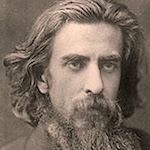
Solovyov
1852 – 1900 CE
Model for Dostoyevsky's characters Alyosha and Ivan in The Brothers Karamazov, major philosophical inspiration for numerous writers from Leo Tolstoy to Rudolf Steiner, Solovyov blended Hellenistic, Buddhist, Kabbalistic, early Christian and Gnostic traditions into a philosophy of Sophia as the merciful unifying feminine wisdom of God evolving consciousness and religion. This philosophy tried to reconcile all bodies of knowledge and understanding in a common ground of absolute unity reconciling all opposites, contradictory ideas, traditions and peoples. Called by the press either a Protestant, Jew, Catholic, rationalist, mystic, or nihilist; he defied categories including place and stable career spending most of his life wandering without a home.
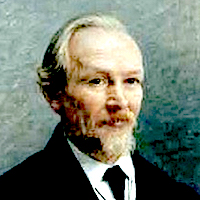
Vasily Vasilievich Rozanov Васи́лий Васи́льевич Рóзанов
1856 – 1919 CE
One of the most controversial Russian writers and philosophers, Dostoyevsky's "Underground Man,” and master of paradox; Rozanov blended criticizing the Russian church to fervent praise, from glorifying Judaism to anti-Semitism, from accepting the naturalness of homosexuality and sex in general to condemning homosexuals and accepting anti-sex Christian views. His open-minded and controversial free thought put him at odds with both the conservative Tsarist government as well as radicals like Lenin. His writings were suppressed and he died by starvation in a monastery shortly after the Russian revolution. He believed politics is obsolete and that "God doesn't want politics any more.” Little know outside Russia and only recently there, he was a deep influence and inspiration for many Russian intellectuals, writers, and philosophers and is now becoming popular with some western scholars.
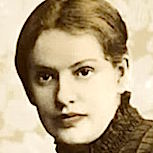
Lou Andreas-Salomé
1861 – 1937 CE
Daughter of a Russian general, icon for 20th century equality-gaining women, erotic pioneer, psychoanalyst student of Sigmund Freud, author of more than 12 books including the first published works on Friedrich Nietzsche, major influence on 19th century intellectual circles, lover and confidant of Rainer Maria Rilke, close friend and/or lover of Nietzsche who she refused to marry, philosopher Paul Rée, Leo Tolstoy, and Boris Pasternak. One of the first female psychoanalysts, in spite of being persecuted by the Nazis and her library destroyed by the Gestapo, she lived a life of intense creativity, freedom, and independence far beyond the status quo of her time.
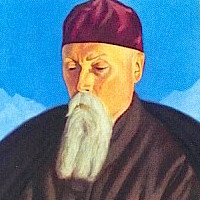
Nicholas Roerich Никола́й Константи́нович Ре́рих
1874 – 1947 CE
Artist, lawyer, archaeologist, theosophist, “enlightener,” and Shambhala pilgrim; Roerich blended mystical understanding with practical work in the world. He actively worked to save art and architecture during wartimes and was nominated for the Nobel Peace Prize many times. Envisioning a future that replaces war and materialism with a flourishing culture of beauty, wisdom and compassion; he established the first modern ecological research station and foresaw the dissolution of isolated, independent countries and the emergence of a Shambhala-like world government. Friend, sponsor, teacher, collaborator with many of the most influential leaders of his day; the list includes Vice President Henry A. Wallace, Ernest Hemingway, Charlie Chaplin, Franklin D. Roosevelt, Gandhi, and Nehru.
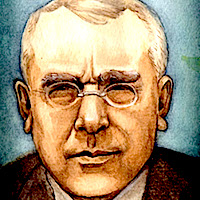
Ouspensky Пётр Демья́нович Успе́нский (Pyotr Demianovich Ouspenskii)
1878 – 1947 CE
Close student, popularizer and critic of Gurdjieff; Ouspensky explained ways to discover the sense beneath the words (“the actual meaning of the thing itself") with a psychological method he described as "a calibration of the tools of human understanding.” Though not religious, he kept one prayer—to at least not during his lifetime become famous. That prayer was granted but he still had a deep impact on many famous people like T. S. Eliot, Aldous Huxley, and many influential writers, psychologists, and journalists. Championing "the esoteric method,” he evolved a philosophy that expanded beyond the Aristotelian logic of A = A to include a more Taoist/Buddhist understanding that A = A and A = not-A. The Buddhist influence extended to his version of mindfulness practice which he described as “being aware of being aware.” His books and influence helped launch what today is called Secular Buddhism but also many New Age versions of spiritual materialism.
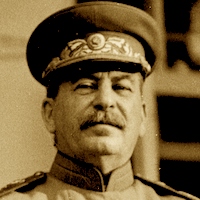
Joseph Stalin Ioseb Besarionis dze Jughashvili
1878
Powerful tyrant who used repression and violence to control almost all of Soviet
Russian life for more than 30 years
Russian revolutionary and totalitarian leader responsible for massive "ethnic cleansing," repression, the execution of hundreds of thousands of citizens, and disastrous famines. His efforts supporting Lenin included kidnapping, robbery, and protection rackets. A fierce dictator holding power in Russia for over 30 years, in 1934 he initiated the Great Purge and imprisoned more than a million people in a forced labor Gulag system that executed more than 700,000. Ruthless, cruel, vindictive, and violent; he became increasingly paranoid, a psychopath who enjoyed humiliating and degrading people. Modern historians report that Stalin caused 6 million deliberate killings including up to 90% of all the elected Russian Central Committee members of the 6th through the 17th Congresses.
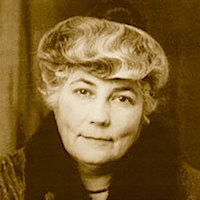
Helena Roerich Елéна Ивáновна Рéрих
1879 – 1955 CE
Theosophist, translator, archeologist, adventurous traveler to unknown inner and outer realms, founder of the Institute of Himalayan Studies, co-creator of the "Agni Yoga" practice of “Living Ethics”; Helena Roerich with her husband Nicholas fearlessly explored remote regions of Mongolia, Tibet, India, China, and the Altai regions of Russia. During these travels, they discovered rare manuscripts, enclaves of wisdom, and many insights into the cultural unity of diverse people. This led to her writing 20 books including the 1926 "Foundations of Buddhism" that helped spark an early Western interest in Buddhism. She co-authored an international treaty signed by heads of 22 countries that helped protect historical monuments, scientific and artistic institutions. A frequent correspondent with president FDR and VP Henry A. Wallace, she was at first a positive influence but then a political liability that led to Wallace’s defeat by Harry Truman.
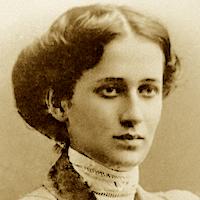
Anna Akhmatova Анна Ахматова (Andreyevna Gorenko)
1889 – 1966 CE
Russia's most loved female poet
One of the most famous Russian poets, strikingly original and courageous critic, powerful and legendary Russian heroine; Anna Akhmatova's chose to remain in her country rather emigrate when her work was condemned by Stalinist censors, her first husband was killed by Soviet secret police, and her son and common-law husband were thrown into the Gulag. During this time her poetry was circulated on scraps of paper that were read once and then immediately burned.
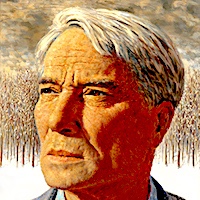
Boris Pasternak Бори́с Леони́дович Пастерна́к
1890 – 1960 CE
Russia's greatest poet
Poet, translator, composer, and novelist; Pasternak wrote some of the most popular poems ever written in the Russian language. Leo Tolstoy was a close family friend and Pasternak's father illustrated his books. Other family friends included Rachmaninoff and Rainer Maria Rilke. Family connections and literary status kept him alive during the Stalin years but even during the Khrushchev era his books were censored. At great personal risk and fearing a firing squad he published Doctor Zhivago in Italy. With the support of the the British MI6 and the American CIA, the book found a wide audience, won a Nobel Prize that Pasternak was forced to reject, and initiated family persecutions that continued until Gorbachev in the 1980s. Since 2003 however, it is read by all 11th grade Russian high school students.
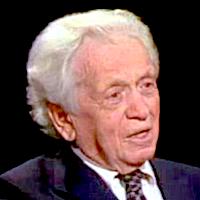
Max Lerner (Maxwell Alan)
1902 – 1992 CE
Journalist, professor, humanist, and controversial cultural commentator; Lerner supported Roosevelt’s New deal, fought against racial discrimination, and gained a high place on Nixon’s hate list. He mainly supported progressive causes but went along with the internment of Japanese Americans during World War II and backed Ronald Reagan. Untied to unthinking political dogma, he was considered a controversial liberal during the 50’s and 60’s but more conservative during the 80’s. A close friend of Elizabeth Taylor, he worked on antiwar efforts, taught at Harvard, Sarah Lawrence, Wellesley, Brandeis, and wrote for the New York Post, the New Republic, The Atlantic, Saturday Review, and many other publications. He applied his dedication to personal responsibility in a struggle with lymphatic cancer which he won and described in a book, Wrestling with the Angel.
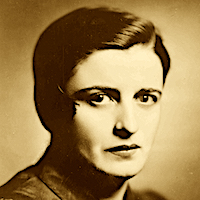
Ayn Rand (Alisa Zinovyevna Rosenbaum)
1905 – 1982 CE
, (1905–)
Tea-Party saint
American conservative, libertarian, and Tea-Party saint; Ayn Rand ridiculed altruism, praised selfishness, and promoted personal and national egoism. She championed laissez-faire capitalism and helped firmly establish a philosophical foundation for raising the 1% richest to unimaginable heights of prosperity, decadence, and materialism. Her book Atlas Shrugged—which became a conservative Bible—described the most rich, wealthy, and powerful ("the 1%") as victims of welfare-surviving children and social programs like social security, unemployment insurance, and medicare.
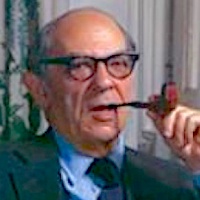
Isaiah Berlin
1909 – 1997 CE
"the world's greatest talker"
Philosopher, political theorist, translator and historian; Berlin lived in Petrograd when he was six during the Russian revolutions of 1917 and then moved to the UK. A star student, he translated famous books from Russian into English and joined the Diplomatic Service during World War II. Highly respected for his lifetime of defending civil liberties, pluralism, and liberal theory; he also became a strong and lasting voice against Communism. With penetrating insight he applied the lessons of history to modern-day problems like nationalism, totalitarianism, racism, and religious bigotry.
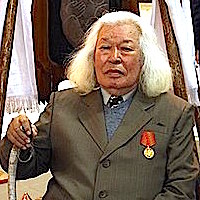
Mongush Kenin-Lopsan Монгуш Кенин-Лопсан
1925 CE –
Head shaman in the Russian Republic, respected historian, archaeologist, writer of more than 50 books, poet, and cultural healer; Kenin-Lopsan was born into a family of nomads and shamans but studied in universities and received Master's and doctoral degrees. He won many literary prizes but was persecuted and imprisoned during the Soviet Union era. When shamanism was recognized by the Russian government and their rituals no longer banned, he helped this tradition re-emerge and grow.
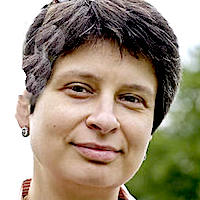
Nina Lvovna Khrushcheva Нина Львовна Хрущёва
1964 CE –
The adopted granddaughter of Nikita Khrushchev and daughter of his biological granddaughter, Nina grew up in the midst of an intense political environment witnessing the rise and fall of Soviet Russia. She saw first hand how Khrushchev was vilified in both Russia and the USA while repudiating Stalin’s legacy of terror and totalitarianism which killed between 30 and 60 million people, releasing millions of Stalin’s victims from gulags, and spearheading reforms that allowed greater political, personal, and artistic freedoms. Now an American Professor of International Affairs, Senior Fellow of the World Policy Institute, and a Contributing Editor to Project Syndicate; she shares her insightful political commentaries in Newsweek, The New York Times, The Wall Street Journal, The Financial Times and in many other publications and boo
Related Sources (0 sources)
Quotes about the Russian Lineage (8 quotes)

“We know what the Nazis did to Jews at Auschwitz. In mass cruelty, the expulsions of Germans ordered by the Russians fall not far short of the atrocities perpetuated by the Nazis.”
Comments: Click to comment
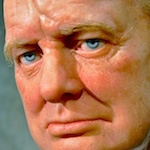
“I cannot forecast to you the action of Russia. It is a riddle wrapped in a mystery inside an enigma; but perhaps there is a key. That key is Russian national interest.”
Comments: Click to comment
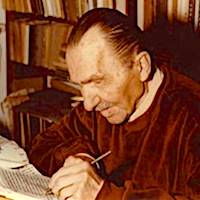
“A great gulf divides the Slavic soul from the Western. The Russian is able to harmonize inner contradictions which are incompatible to the European's rationality... The Russian places the soul above everything else, the dark, rich, contradictory, intricate force which pushes man beyond rationality to violent, irresponsible passion... The Russian is still tightly glued to the soil; he is filled with earth and world-engendering darkness.”
Comments: Click to comment

“In 1300 Russia did not exist... united only in common subjection to the Golden Horde, the chief results from this long subjection were social: the autocracy of the Moscow dukes, the servile loyalty of the people to their princes, the low status of woman, the military, financial, and judicial organization of the government on Tartar lines... The Russian people faced the most arduous conditions with silent stoicism”
Comments: Click to comment

“I judged Russia foolishly in 1932. Despite my addiction to history I failed to interpret those awful condition in the light of the past... When Ariel and I traveled through Siberia and European Russia; there we saw not Utopia but chaos, regimentation, brutality, and starvation”
Comments: Click to comment

“Give me bitter years of sickness,
Suffocation, insomnia, fever,
Take my child and my lover,
And my mysterious gift of song —
So that the stormcloud over darkened Russia
Might become a cloud of glorious rays.”
Comments: Click to comment

“They don’t ask much of you. They only want you to hate the things you love and to love the things you despise. (June 1960)”
Comments: Click to comment
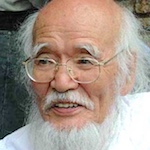
“the decline of European civilization arises from the Western philosophy of placing onesef first; that in trying to protect one's person with a stone castle Europeans have ended by enclosing the self within a prison.”
Comments: Click to comment
Comments (0)